- Home
- Jack Higgins
Sheba
Sheba Read online
This is a work of fiction. Names, characters, places, and incidents are either the product of the author’s imagination or are used fictitiously, and any resemblance to actual persons, living or dead, business establishments, events or locales is entirely coincidental.
SHEBA
A Berkley Book / published by arrangement with the author
All rights reserved.
Copyright © 1995 by Higgins Associates Limited
This book may not be reproduced in whole or part, by mimeograph or any other means, without permission. Making or distributing electronic copies of this book constitutes copyright infringement and could subject the infringer to criminal and civil liability.
For information address:
The Berkley Publishing Group, a division of Penguin Putnam Inc.,
375 Hudson Street, New York, New York 10014.
The Penguin Putnam Inc. World Wide Web site address is
http://www.penguinputnam.com
ISBN: 978-1-1011-9135-4
A BERKLEY BOOK®
Berkley Books first published by The Berkley Publishing Group, a member of Penguin Putnam Inc.,
375 Hudson Street, New York, New York 10014.
Berkley and the “B” design are trademarks belonging to Penguin Putnam Inc.
Electronic edition: May, 2002
Contents
MARCH 1939 BERLIN
1
2
AUGUST 1939 DAHREIN
3
4
5
6
7
8
9
10
11
12
13
14
15
16
17
18
Books by Jack Higgins
DRINK WITH THE DEVIL
YEAR OF THE TIGER
ANGEL OF DEATH
SHEBA
ON DANGEROUS GROUND
THUNDER POINT
EYE OF THE STORM (also published as MIDNIGHT MAN)
THE EAGLE HAS FLOWN
COLD HARBOUR
MEMORIES OF A DANCE-HALL ROMEO
A SEASON IN HELL
NIGHT OF THE FOX
CONFESSIONAL
EXOCET
TOUCH THE DEVIL
LUCIANO’S LUCK
SOLO
DAY OF JUDGMENT
STORM WARNING
THE LAST PLACE GOD MADE
A PRAYER FOR THE DYING
THE EAGLE HAS LANDED
THE RUN TO MORNING
DILLINGER
TO CATCH A KING
THE VALHALLA EXCHANGE
NIGHT JUDGMENT AT SINOS
THE PRESIDENT’S DAUGHTER
FLIGHT OF EAGLES
THE WHITE HOUSE CONNECTION
EAST OF DESOLATION
In 24 B.C. the Roman General Aelius Gallus tried to conquer Southern Arabia and succeeded only in losing most of his army in the awesome region known as the Empty Quarter, the Rubh Al Khali. Amongst the survivors was a Greek adventurer named Alexias, Centurion in the Tenth Legion, who walked out of the desert carrying with him a secret of the ancient world as astonishing as King Solomon’s Mines, a secret that was lost for two thousand years. Until . . .
MARCH 1939
BERLIN
1
AS RAIN DRIFTED ACROSS BERLIN IN A GREAT CURTAIN on the final evening of March, a black Mercedes limousine moved along Wilhelmstrasse toward the new Reich Chancellery, which had only opened in January. Hitler had given them a year to complete the project. His orders had been obeyed with two weeks to spare. Admiral Wilhelm Canaris, Chief of Military Intelligence, the Abwehr, leaned forward and wound down the window so that he could obtain a better view.
He shook his head. “Incredible. Do you realize, Hans, that the frontage on Voss-Strasse alone is a quarter of a mile long.”
The young man who sat next to him was his aide, a Luftwaffe Captain named Hans Ritter. He had an Iron Cross Second and First Class and was handsome enough until he turned his head and the dreadful burn scar was visible on his right cheek, and there was a walking stick on the floor at his feet, the unfortunate result of his having been shot down by an American volunteer pilot while flying with the German Condor Legion in the Spanish Civil War.
“With all those pillars, Herr Admiral, and marble, it’s more like some marvel of the ancient world.”
“Instead of a symbol of the new order?” Canaris shrugged and wound up the window. “Everything passes, Hans, even the Third Reich, although our beloved Führer has given us a thousand years.” He took a cigarette from his case and Ritter gave him a light, as always slightly alarmed at the mocking in the older man’s voice.
“As you say, Herr Admiral.”
“Yes, it’s a bizarre thought isn’t it? One day people could be wandering around what’s left of the Chancellery, tourists, just like they inspect the ruins of the Temple of Luxor in Egypt, saying: ‘I wonder what they were like?’ ”
Ritter was thoroughly uncomfortable now as the Mercedes drove through the gilded gates into a court of honor and moved toward the steps leading up to the massive entrance. “If the Herr Admiral could give me an idea of why we’ve been called.”
“I haven’t the slightest notion, and it’s me he wants to see, not you, Hans. I simply want you on hand if anything unusual turns up.”
“Shall I wait in the car?” Ritter asked as they pulled up at the bottom of the steps.
“No, you can wait in reception. Much more comfortable, and you’ll be able to feast on the new art forms of the Third Reich. Vulgar, but sustaining.”
The Kriegsmarine Petty Officer who was his driver ran round to open the door. Canaris got out and waited courteously for Ritter, who had considerably more difficulty. His left leg was false from the knee down, but once on his feet he moved quite well with the aid of his stick, and they went up the steps together.
The S.S. guards were troops of the Leibstandarte Adolf Hitler and wore black dress uniform and full white leather harness. They saluted smartly as Canaris and Ritter passed inside. The hall was truly remarkable with mosaic floor, doors seventeen feet high and great eagles carrying swastikas in their claws. A young Hauptsturmführer in dress uniform sat at a gold desk, two orderlies standing behind. He jumped to his feet.
“Herr Admiral. The Führer has asked for you twice.”
“My dear Hoffer, I didn’t get his summons until half an hour ago,” Canaris said. “Not that that will do me any good. This is my aide, Captain Ritter. Look after him for me.”
“Of course, Herr Admiral.” Hoffer nodded to one of the orderlies. “Take Herr Admiral to the Führer’s reception suite.”
The orderly set off at a sharp pace and Canaris went after him. Hoffer came round the desk and said to Ritter, “Spain?”
“Yes.” Ritter tapped his false foot. “I could still fly, but they won’t let me.”
“What a pity.” Hoffer said and led him over to the seating area. “You’ll miss the big show.”
“You think it will come?” Ritter asked, easing himself down and taking out his cigarette case.
“Don’t you? And by the way, no smoking. Führer’s express order.”
“Damn!” Ritter said, for his pain was constant and cigarettes helped.
“Sorry,” Hoffer said sympathetically. “But coffee we do have and it’s the best.”
He turned, went to his desk, and picked up the phone.
When the guard opened the enormous door to Hitler’s study, Canaris was surprised at the number of people in the room. There were the three Commanders in Chief, Goering for the Luftwaffe, von Brauchitsch for the Army, and Raeder for the Kriegsmarine. There was Himmler, von Ribbentrop, generals like Jodl, Keitel, and Halder. There was a heavy sil
ence and heads turned as Canaris entered.
“Now that the Admiral has deigned to join us, we can begin,” Hitler said. “And I will be brief. As you know, the British today gave the Poles an unconditional guarantee of their full support in the event of war.”
Goering said. “Will the French follow, my Führer?”
“Undoubtedly,” Hitler told him. “But they will do nothing when it comes to the crunch.”
“You mean invade Poland?” Halder, who was Chief of Staff at OKW, said. “What about the Russians?”
“They won’t interfere. Let us say there are negotiations in hand and leave it at that. So gentlemen, my will is fixed in this matter. You will prepare Case White, the invasion of Poland on September the first.”
There were shocked gasps. “But my Führer, that only gives us six months,” Colonel General von Brauchitsch protested.
“Ample time.” Hitler told him. “If there are those who disagree, speak now.” There was a profound silence. “Good, then get to work, gentlemen. You may all leave except for you, Herr Admiral.”
They all filed out and Canaris stood there waiting while Hitler looked out of the window at the rain. Finally he turned. “The British and the French will declare war, but they won’t do anything. Do you agree?”
“Absolutely,” Canaris said.
“We smash Poland, wrap things up in a few weeks. Once it’s done, what is the point of the British and French continuing? They’ll sue for peace.”
“And if not?”
Hitler shrugged. “Then I’ll have Case Yellow implemented. We’ll invade Belgium, Holland, France and drive the English into the sea. They’ll come to their senses then. After all, they are not our natural enemies.”
“I agree,” Canaris said.
“Having said that, it occurs to me that I should demonstrate to our English friends as soon as possible that I do mean business.”
Canaris cleared his throat. “Exactly what do you have in mind, my Führer?”
Hitler gestured toward the huge map of the world that hung on the far wall. “Come over here, Herr Admiral, and let me show you.”
When Canaris returned to the reception hall at the Chancellery an hour later, Hoffer was seated behind his desk with the two orderlies. There was no sign of Ritter. The S.S. Captain stood up and came to greet him.
“Herr Admiral.”
“My aide?” Canaris asked.
“Hauptmann Ritter was badly in need of a smoke. He went back to your car.”
“My thanks,” Canaris said. “I’ll find my own way.”
He went out of the huge doors and stood at the top of the steps, buttoning his greatcoat, looking out at the rain. He went down the steps and had the rear door of the limousine open before his driver realized what was happening and climbed in beside Ritter.
“My office,” he called to the driver, then closed the glass partition.
Ritter started to stub out his cigarette as they drove away and Canaris sat back. “Never mind. Just give me one of those things. I need it.”
Ritter got his cigarette case out and offered a light. “Is everything all right, Herr Admiral? I saw them all leave. I was worried.”
“The Führer, Hans, gave us his personal order to invade Poland on September the first.”
“My God,” Ritter said. “Case White.”
“Exactly. He has been negotiating with the Russians who will do a deal, if you follow me. They’ll let us get on with it in return for a slice of eastern Poland.”
“And the British?”
“Oh, they’ll declare war and I’m sure the French will go along. The Führer, however, is convinced they will do nothing on the Western Front, and for once I agree. They’ll sit there while we wrap up Poland, and his feeling is that once it’s an accomplished fact, we can all get round the negotiating table and get back to the status quo. Britain, as he informed us, is not our natural enemy.”
“Do you agree, Herr Admiral?”
“He’s right enough there, but the British are a stubborn lot, Hans, and Chamberlain is not popular. Since Munich, his own people despise him.” Canaris stubbed out his cigarette. “If there was a change at the top, Churchill for example.” He shrugged. “Who knows?”
“And what would we do?”
“Implement Case Yellow. Invade the Low Countries and France and drive whatever army the British had brought across the Channel into the sea.”
There was a pause before Ritter said, “Could this be done?”
“I think so, Hans, as long as the Americans don’t interfere. Under the Führer’s inspired leadership, we have reoccupied the Rhineland, absorbed Austria and Czechoslovakia plus one or two bits and pieces. I have no doubt we’ll win in Poland.”
“But afterwards, Herr Admiral? The French, the British?”
“Ah, well, now we come down to why the Führer kept me back when everyone else left.”
“A special project, Herr Admiral?”
“You could say that. He wants us to blow up the Suez Canal on the first of September, the day we invade Poland.”
Ritter, in the act of snapping his cigarette case open, said, “Good God!”
Canaris took the case from him and helped himself. “He got the idea from this Colonel Rommel, who commanded the Führer’s escort battalion for the occupation of the Sudetenland. He thinks highly of Colonel Rommel and with reason, and there is a certain mad logic to the idea. I mean, the Suez Canal is the direct link to the British Empire. Cut it and all shipping to India, the Far East, and Australia would have to go by way of Africa and the Cape of Good Hope. The military implications speak for themselves.”
“But Herr Admiral, how on earth would we get men and equipment into the area?”
Canaris shook his head. “No, Hans, you’ve got it wrong. We’re not talking direct military action here, we’re talking sabotage. The Führer wants us, the Abwehr, to blow up the Suez Canal on the day we invade Poland. Put the damn thing out of action. Close it down so fully that it would take a year or so to open it again.”
“What a coup. It would shock the world,” Ritter said.
“More to the point, it would shock the British to the core and make them realize we mean business. At least that’s the way our beloved Führer sees it.” Canaris sighed. “Of course, how the hell we are to accomplish this is another matter, but we’ll have to come up with something, at least on paper, and that’s where you come in, Hans.”
“I see, Herr Admiral.”
The limousine pulled in to the curb outside the Abwehr offices at 74-76 Tirpitz Ufer. The Petty Officer hurried round to open the door for Canaris, and Ritter scrambled out after him. The young Luftwaffe Officer was frowning slightly.
Canaris said. “Are you all right?”
“Fine, Herr Admiral. It’s just that there’s something stirring at the back of my mind, something that could suit our purposes.”
“Really?” Canaris smiled and led the way up the steps, pausing at the door. “Well, that is good news, but sooner rather than later, Hans, remember that,” and he led the way inside.
It was perhaps an hour later and Canaris was seated at his desk working his way through a mass of papers, his two favorite dachshunds asleep in their basket in the corner, when there was a knock at the door and Ritter entered with a file in one hand and a rolled-up map under his arm. He limped forward, leaning on his stick.
“Could I have a word, Herr Admiral, on this Suez Canal venture?”
Canaris sat back. “So soon, Hans?”
“As I said, there was something at the back of my mind, and when I got to my office I remembered. A report I received last month from a Professor of Archaeology here at the University, Professor Otto Muller. He’s recently returned from Southern Arabia. Intends to go back there soon. He needs additional funding.”
“And what has this to do with us?” Canaris asked.
“As the Herr Admiral knows, all German citizens working abroad have to make a report to us here at Abwehr Headquar
ters of anything of an unusual nature that they may have come across.”
“So?”
“Allow me, Herr Admiral.” Ritter went across to the map board on the far wall, unrolled the map under his arm, and pinned it in place. It showed Egypt and the Suez Canal, the whole of Southern Arabia, the Red Sea, and the Gulf of Aden. “As you can see, Herr Admiral, the British are in Aden, the Yemen, and then various Arab states along the Gulf of Aden and the Indian Ocean, Dhofar, and the Oman.”
“Well?” Canaris asked, examining the map.
“You will notice Dahrein, a port on the Gulf Coast. This is where Muller was working from. It belongs to Spain. Rather like Goa on the Indian coast. The Spaniards have been there for four hundred years.”
“I can imagine what the place is like,” Canaris said.
“North across the border with Saudi Arabia is the Rubh Al Khali, the Empty Quarter, one of the most awesome deserts on earth.”
“And this is where Muller was operating?”
“Yes, Herr Admiral.”
“But what on earth was he doing?”
“There are remains of many ancient civilizations in the area, inscriptions and graffiti on the rocks. Muller is an expert on ancient languages. He uses a rubber and latex solution to take impressions, which are brought back here to the University.”
“And what has this to do with the Suez Canal, Hans?”
“Bear with me, Herr Admiral. The area around there called Saba has long been associated with the Queen of Sheba.”
“My God,” Canaris said and returned to his desk. “Now it’s the Bible.” He took a cigarette from a silver box. “I always understood that except for the biblical reference there has never been actual proof that she existed.”
“Oh, she did exist, I can assure you,” Ritter said. “There was a cult of the Arabian goddess, Asthar, their equivalent of Venus. In legend, the Queen of Sheba was high priestess of that cult and built a temple out there in the Empty Quarter.”
“In legend,” Canaris said.
“Muller has found the ruins of it, Herr Admiral. Naturally he kept his discovery quiet. Such an event would rival the discovery of Tutankhamen’s tomb in the Valley of the Kings. Archaeologists would descend from all over the world. As I said, he returned to Berlin for funding, but made a full description of his find in his report to the Abwehr.”

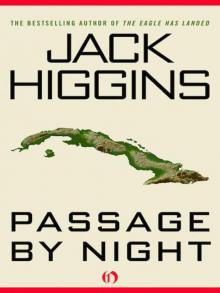 Passage by Night (v5)
Passage by Night (v5) The Death Trade sd-20
The Death Trade sd-20 Cold Harbour
Cold Harbour Without Mercy
Without Mercy Solo (Aka the Cretan Lover)(1980)
Solo (Aka the Cretan Lover)(1980) First Strike
First Strike Confessional - Devlin 03 (v5)
Confessional - Devlin 03 (v5) The Midnight Bell
The Midnight Bell Confessional
Confessional Sad Wind from the Sea (v5)
Sad Wind from the Sea (v5) In The Hour Before Midnight aka The Sicilian Heritage
In The Hour Before Midnight aka The Sicilian Heritage Wrath of the Lion
Wrath of the Lion SDillon 20 - The Death Trade
SDillon 20 - The Death Trade the Iron Tiger (1974)
the Iron Tiger (1974)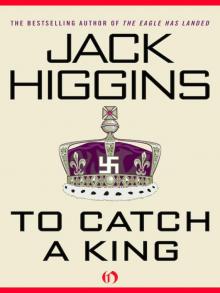 To Catch a King
To Catch a King Bloody Passage (1999)
Bloody Passage (1999) Wrath of the Lion sd-8
Wrath of the Lion sd-8 Sharp Shot
Sharp Shot Pay the Devil (v5)
Pay the Devil (v5) A Devil Is Waiting
A Devil Is Waiting Dark Side of the Street - Simon Vaughn 01 (v5)
Dark Side of the Street - Simon Vaughn 01 (v5) Midnight Runner - Sean Dillon 10
Midnight Runner - Sean Dillon 10 Wrath of God
Wrath of God A Fine Night for Dying
A Fine Night for Dying Hell Is Too Crowded v5)
Hell Is Too Crowded v5) the Iron Tiger (v5)
the Iron Tiger (v5) Dark Side of the Street pc-5
Dark Side of the Street pc-5 Hell Is Always Today
Hell Is Always Today Eagle Has Landed
Eagle Has Landed A Fine Night for Dying pc-6
A Fine Night for Dying pc-6 the Last Place God Made (v5)
the Last Place God Made (v5) the Valhalla Exchange (1976)
the Valhalla Exchange (1976) The Eagle Has Flown
The Eagle Has Flown Sure Fire
Sure Fire Pay the Devil (1999)
Pay the Devil (1999) Memoirs of a Dance Hall Romeo
Memoirs of a Dance Hall Romeo![a Prayer for the Dying (1974)[1] Read online](http://i1.bookreadfree.com/i1/04/02/a_prayer_for_the_dying_19741_preview.jpg) a Prayer for the Dying (1974)[1]
a Prayer for the Dying (1974)[1] Comes the Dark Stranger
Comes the Dark Stranger Dark Side Of the Island (v5)
Dark Side Of the Island (v5) The White House Connection sd-7
The White House Connection sd-7 Dillinger (v5)
Dillinger (v5) Eye of the Storm
Eye of the Storm Eye Of The Storm aka Midnight Man
Eye Of The Storm aka Midnight Man A Darker Place
A Darker Place Year Of The Tiger
Year Of The Tiger Death Run
Death Run the Savage Day - Simon Vaughn 02 (v5)
the Savage Day - Simon Vaughn 02 (v5) Bloody Passage (v5)
Bloody Passage (v5) The Bormann Testament
The Bormann Testament On dangerous ground sd-3
On dangerous ground sd-3 Dark Justice
Dark Justice Sheba
Sheba The Graveyard Shift
The Graveyard Shift Exocet (1983)
Exocet (1983) The Wolf at the Door
The Wolf at the Door The wolf at the door sd-17
The wolf at the door sd-17 Touch The Devil
Touch The Devil The President’s Daughter
The President’s Daughter A Prayer for the Dying (v5)
A Prayer for the Dying (v5) Dark Side Of The Street
Dark Side Of The Street Dillinger (1983)
Dillinger (1983) Midnight Never Comes pc-4
Midnight Never Comes pc-4 Hell Is Too Crowded (1991)
Hell Is Too Crowded (1991) Edge of Danger sd-9
Edge of Danger sd-9 The Thousand Faces of Night (v5)
The Thousand Faces of Night (v5) Night Of The Fox
Night Of The Fox Bad Company
Bad Company The Killing Ground
The Killing Ground The Judas gate sd-18
The Judas gate sd-18 The Thousand Faces of Night (1961)
The Thousand Faces of Night (1961) Solo (Aka the Cretan Lover) (v5)
Solo (Aka the Cretan Lover) (v5) The Dark Side Of The Island
The Dark Side Of The Island A Devil is vaiting sd-19
A Devil is vaiting sd-19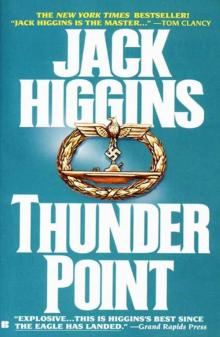 Thunder Point
Thunder Point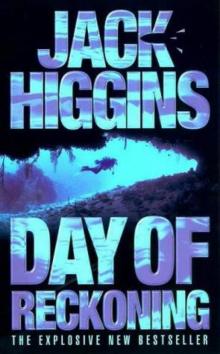 Day of Reckoning sd-8
Day of Reckoning sd-8 the Valhalla Exchange (v5)
the Valhalla Exchange (v5) In the Hour Before Midnight
In the Hour Before Midnight The Bormann Testament (The Testament of Caspar Schultz)
The Bormann Testament (The Testament of Caspar Schultz) The Judas Gate
The Judas Gate Luciano's Luck
Luciano's Luck Sad Wind from the Sea (1959)
Sad Wind from the Sea (1959)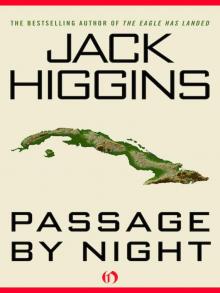 Passage by Night (1987)
Passage by Night (1987) Exocet (v5)
Exocet (v5)